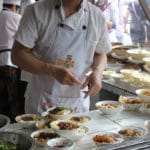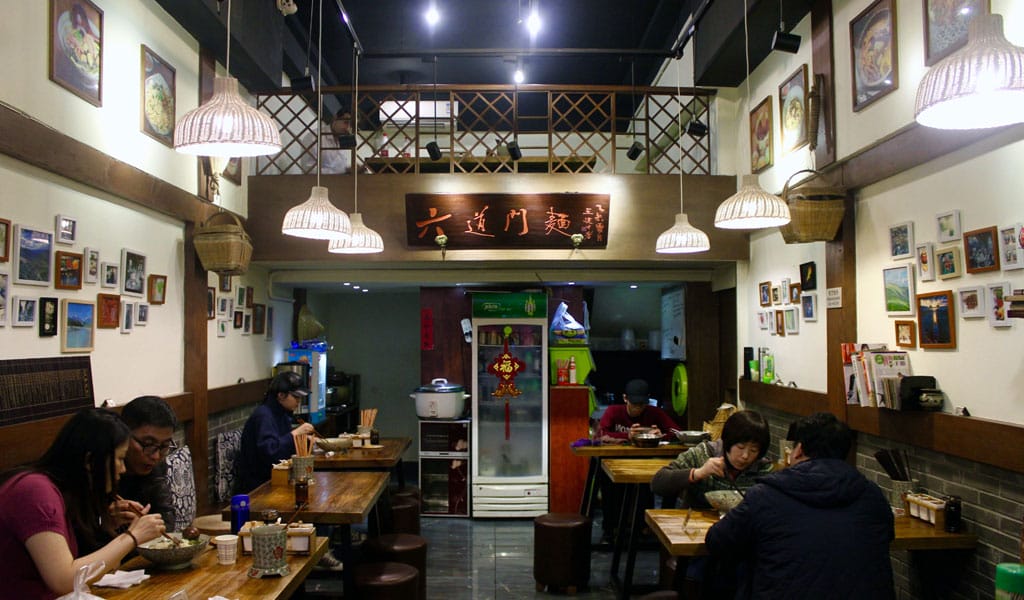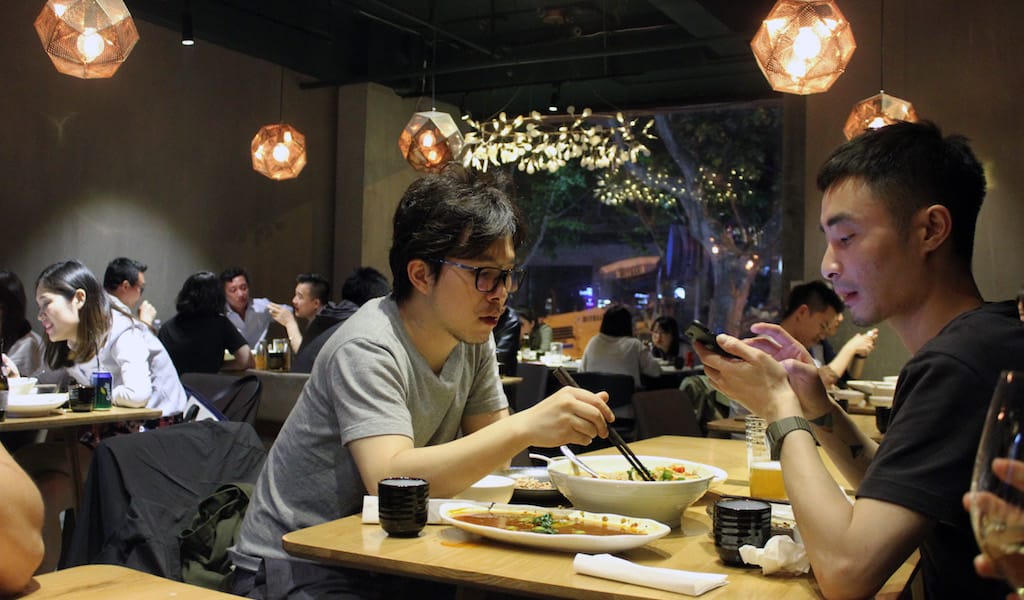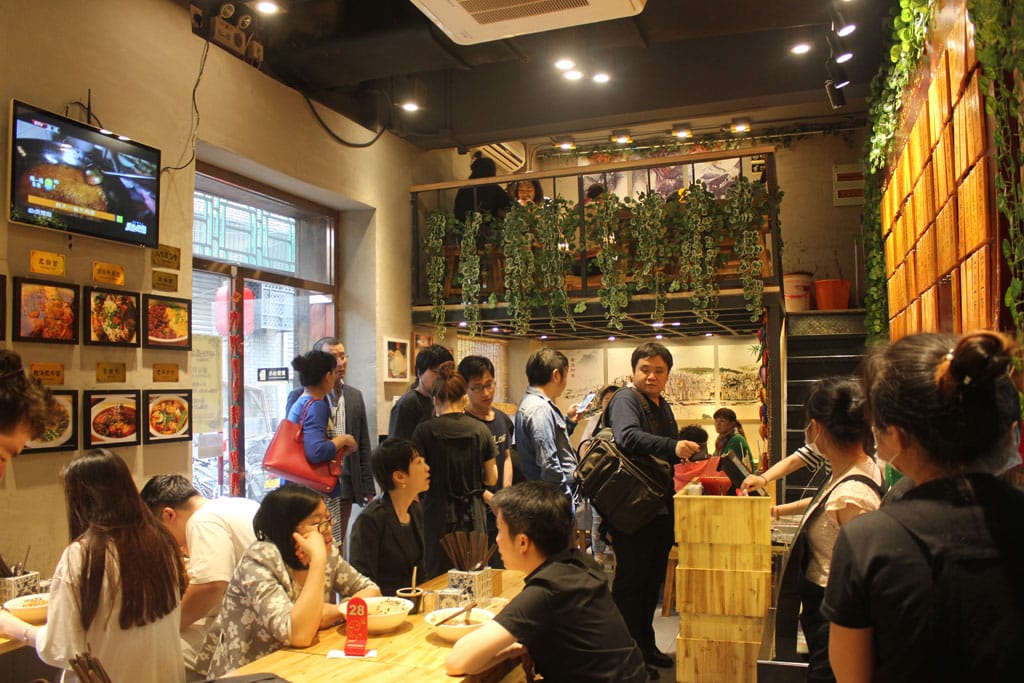In the past year, we’ve seen more new noodle houses hawking spicy Chengdu and Chongqing style noodles than we can count on two hands. Very few of the Shanghai-based noodle houses do the fly restaurants of Chengdu justice. Some dish out bowls of insipid strands that barely register on the Scoville scale, while others go for that unbalanced, burn-your-face-off flare that means the chef has likely never been to Sichuan, much less studied the careful art of the region’s balanced cooking.
Liu Tang Men is among the exceptions, carefully walking the tightrope of spicy yet tasty, with its menu of Chengdu noodle classics. It makes Shanghai’s best bowl of dan dan mian (担担面), and is the only place in the city with sweet-water noodles (甜水面, tián shuǐmiàn) worthy of its Sichuan designation. Both are only one liǎng (两) , or 50-gram, portions and come in miniature bowls that when eaten together almost make a meal, so consider them side dishes to other noodles. The other noodles on the menu all come standard with sān liǎng (三两), or 150-gram portions, although there is a small sign under the spice levels that warns that you can add or remove some of the noodles when you order – and notes that it’s honorable to order just enough to be full. Wasting food (and napkins) is “shameful.”

Owned by a middle-aged musician who left Chengdu to make his name in the Shanghai rock scene in the 1980s, Liu Tang Men is a small but friendly shop. The kitchen is barely the size of a closet, but 50 noodle slurpers can fit comfortably in the dining room – which is good during peak meal time when diners flock here. Despite the metal roots of the owner, the soundtrack is a toss-up. During our last meal there, the music flitted from Bob Marley to Jay Chou to Carrie Underwood.
But when the noodles come together better than a Beethoven symphony, who cares what’s coming out of the speakers? We recommend ordering a bowl of the cowpea noodles (碗杂面 – 拌的, wǎn zá miàn – bàn de) dry, as the soup only distracts. The dish doesn’t look like much when it comes: golden chickpeas, just-wilted greens and a scoop of minced meat piled on top of plain, thin noodles – but when mixed, the bowl becomes so much more than the sum of its parts. Order a poached egg (煎荷包蛋, jiān hébāodàn), lightly fried on both sides and splashed with soy sauce, to add heft.
If you’re worried about your spice tolerance, note the bilingual sign with spice levels under the tiled Mandarin menu. You will not be the first foreigner who uses it – this place is getting a reputation for its excellent noodles amongst laowai in the know. On each table is a spice box, divided in three, with salt, crushed Sichuan peppercorn and chili oil, if you want a little extra kick, but give it a few bites first – it’s a slow burn. The first couple of mouthfuls hardly hits you, but by the end of the meal, you’ll have a mouth-numbing tingle.
Editor’s note: The restaurant’s name was changed from Liu Dao Men to Liu Tang Men.
 March 31, 2021 Ben Lai & Ben Zhen
March 31, 2021 Ben Lai & Ben Zhen
Sichuan cuisine is famous for its mouth-numbing, spicy flavors, but what many people […] Posted in Shanghai August 31, 2016 Pang Mei Mian Zhuang
August 31, 2016 Pang Mei Mian Zhuang
“Can you eat spice?” the waitress asked after taking our order. Her hand hovered […] Posted in Beijing July 27, 2016 CB on the Road
July 27, 2016 CB on the Road
When you’re in the capital of Sichuan province, snacking is a way of life. Noodles made […] Posted in Shanghai
Published on April 05, 2017
Related stories
March 31, 2021
Shanghai | By Jamie Barys
ShanghaiSichuan cuisine is famous for its mouth-numbing, spicy flavors, but what many people don’t know is that the provincial cuisine is subdivided into several specialty subregional cuisines. One of our favorites is Xiaohe Sichuan cuisine, which hails from the cities of Zigong, Luzhou and Yibin in the province’s southern region. Originally famous for its salt…
Check out our newest culinary walks in Beijing!
August 31, 2016
Beijing“Can you eat spice?” the waitress asked after taking our order. Her hand hovered hesitantly over the cash register. “Yes,” we replied. “But... Can you?” she asked again, looking to the other waitresses for help. “Yes!” we responded emphatically, trying to vocally convey our love of the tongue-tingling, lip-burning action we had come for. “Umm...…
July 27, 2016
ShanghaiWhen you’re in the capital of Sichuan province, snacking is a way of life. Noodles made of bracken, wheat, eeickpeas, mung beans and more, as well as tofu puddings and dumplings, make up the city’s “small eats” (小吃, xiǎochī) scene, served from what’s colloquially known as “fly restaurants.” A step above street food, these family-owned…


















































































